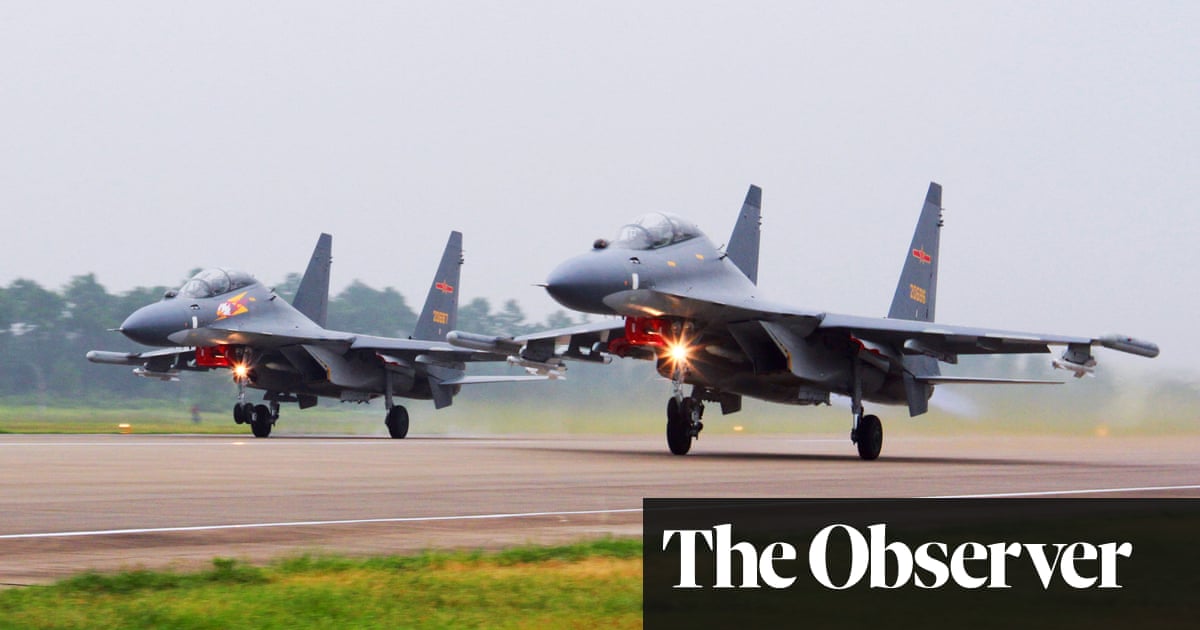Taiwan has reported that a dozen Chinese warplanes flew sorties close to the island on Saturday, in a sudden surge of military activity just hours after the US secretary of state, Antony Blinken, left Beijing following talks with President Xi Jinping and top Chinese officials.
Before Blinken’s three-day visit to China, US officials had pointed to a period of relative calm in the Taiwan strait over the past few months, after years of aggressive Chinese military manoeuvres and threats, as a factor in improving US-Chinese relations since Joe Biden held a summit meeting with Xi in November.
While welcoming the thaw in relations and more frequent contact, Blinken had come with an ultimatum for Beijing, calling on it to stop Chinese companies supplying components and materials to the Russian defence industry or face new sanctions.
The US also angered China this week when Congress passed a supplemental spending bill with billions of dollars in military aid to Taiwan. At a meeting with Blinken on Friday afternoon, Xi is said to have become particularly animated on the subject of Taiwan, accusing the US of interfering in Chinese affairs and encouraging pro-independence sentiment on the island.
In his public remarks, Xi told Blinken: “The two countries should help each other succeed rather than hurt each other, seek common ground and reserve differences rather than engage in vicious competition.”
Earlier, China’s foreign minister, Wang Yi, had warned of a “downward spiral” in relations if the US stepped on Chinese “red lines”.
Blinken said that while in China he had stressed the “critical importance” of maintaining peace and stability across the strait.
Beijing has often used aggressive military manoeuvres to signal its displeasure at any moves in Washington it sees as diverging from the US’s established “one China” policy of discouraging Taiwanese moves towards separatism. A 2022 visit to Taipei by the then speaker of the House of Representatives, Nancy Pelosi, led to months of Chinese military manoeuvres in the Taiwan strait.
On Saturday morning, while Blinken was in the air on the way back to Washington, Taiwan’s defence ministry said it had detected 22 Chinese military aircraft, including Su-30 fighters, over the strait, of which 12 had crossed the median line, which in the past has been recognised by both sides as an unofficial border.
The Taiwanese foreign ministry described the sorties as “joint combat readiness patrols” with Chinese warships, adding that Taiwanese aircraft and ships responded “appropriately”, without giving details.
In the past, Taipei has scrambled jets and deployed naval vessels to demonstrate its resolve not to accept encroachment by the Chinese military.
Washington had been braced for China to ratchet up its activity in the strait, particularly with the approaching inauguration of a new Taiwanese president, Lai Ching-te, on 20 May. Beijing portrays Lai as a dangerous separatist and has refused to hold talks with him.
The Blinken team did not expect breakthroughs during his visit to Shanghai and Beijing, and was anticipating a backlash against the US threat of sanctions over support for Russia’s industrial base.
After the visit, US officials said they hoped that similar warnings from European countries – for example when Xi visits Paris early next month – would lead Beijing to recalibrate its interests. They pointed out that China had so far been dissuaded by international pressure from sending Russia weapons, and that Beijing would be instrumental in dissuading Vladimir Putin from any thought of using nuclear weapons in the conflict.
Much of Blinken’s interaction with the Chinese leadership during his visit was taken up by a mutual airing of grievances. The secretary of state told CNN in an interview just before leaving Beijing that the US had seen evidence of attempts by Beijing to “influence and arguably interfere” in this year’s US elections.
But, assessing the outcome of the trip, US officials pointed to the importance of maintaining dialogue after several years of almost no contact – a silence they said had heightened the dangers of a conflict breaking out by miscalculation.
As well as high-level dialogue involving the presidents and foreign ministers, communication channels have been re-established between the two countries’ militaries since the Xi-Biden summit in San Francisco, a connection Blinken sought to deepen on this trip.
The two governments agreed on Friday to start the first US-China talks on mitigating the risks of artificial intelligence, which are due to take place in Geneva in the coming weeks, and the two sides continued discussions with Chinese ministers on joint efforts to curb the production and trafficking of the synthetic opioid fentanyl, which Blinken noted was the leading cause of death among Americans aged 18 to 45.

